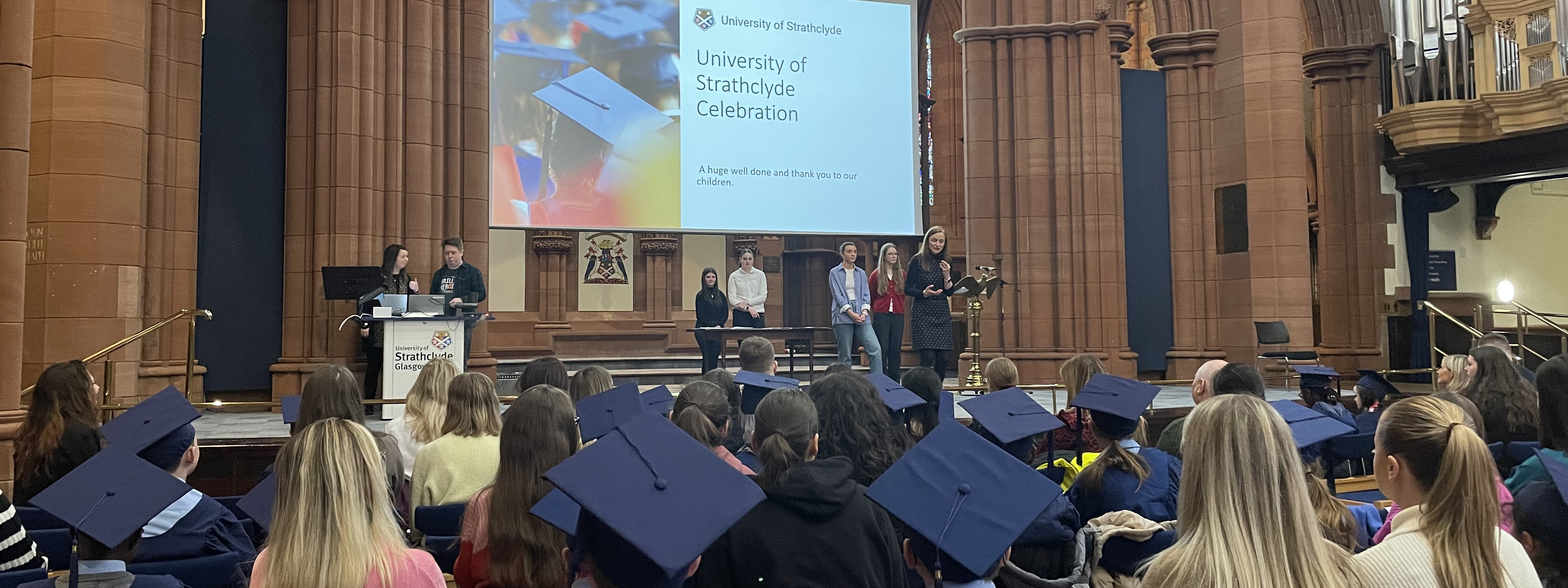
School pupils from Glasgow who participated in a 10-week literacy & numeracy programme run by the University of Strathclyde have had their achievements celebrated at a special on-campus event.
The Strathclyde Literacy and Numeracy Clinic has seen student teachers from Strathclyde coach in literacy and numeracy with primary pupils, at five schools in the city, often including those who have English as an additional language.
Over the period of the Clinic, student teachers work in teams with pupils, to support their identity and agency as numeracy and literacy learners. Responsive interactions and experiences are at the heart of learning and teaching.
The pupils who participated in the Clinic donned gowns and received certificates to mark their achievements at the ceremony at Strathclyde’s Barony Hall.
Jenny Carey, of the Strathclyde Institute of Education, who leads the Clinic, said: “I am delighted and thankful for the opportunity to collaborate with school staff to shape students’ understanding of a developing and inclusive curriculum.
"The Clinic offers an amazing platform for the University students to achieve impact and a great strength comes from them working together in groups to support individual children. The level of professional practice and intellectual rigour they show in their approach is remarkable.
During the Clinic celebration in the Barony Hall, I was delighted to hear some of the things that children shared about the ways they had become more confident as numeracy learners. It was also a special moment when our students let children know about what they had learned from them as numeracy teachers. This is a reciprocal process that supports learning for both parties.
What pupils think
Pupils who took part in the Clinic enjoyed their experience and found it helpful.
Barbara, of Oakwood Primary, said: “I liked it because I wrote a book about Stitch, my favourite Disney character. It’s a great experience to get my certificate.”
Zak, also of Oakwood Primary, said: “I’m really excited to be here for my certificate. I enjoyed the reading and getting help from the teachers.”
Hallie, a pupil at St Anne’s Primary, said: “I felt I got better in my number skills. Once we finished a task I got to play a game which was really fun.”
Tamando, also of St Anne’s, said: “I feel like I improved my numbers. I looked forward to working with the students. It was fun.”
Eilidh Logan, one of the University student teachers, who supported a pupil who has English as an additional language, said: “Our pupil loves reading; whenever we were there, he wanted to read with us. He's looking forward to the celebration we’ll have at Strathclyde for the pupils in the Clinic. He said that when he grows up, he wants to be a teacher and a reading buddy – just like us! Small things like this make it even more meaningful.
“You learn from children as much as they learn from you. It’s hands down one of the best modules we've had. It’s just half an hour a week but you wish it was longer.”

Student Amanda McAdam, who worked with the same pupil as Eilidh, said: “I planned the sessions as a 10-minute catch-up, 10 minutes of reading and a 10-minute active literacy task. This evolved into analysing comic book strips, as his interests revolved around boxing, football, drawing and the Hulk. We created our own comic strip together, alongside reading tasks.
“Talking to someone about your experience as a reader, and about enjoying a text, makes it more interesting, as it links to everyone’s need to build relationships, connect and communicate.”
What teachers think
Greg Steer, a Principal Teacher at Royston Primary in Glasgow, has experienced the Literacy and Numeracy Clinic both as a Strathclyde student and as a teacher. He believes the opportunity to teach through the Clinic helped him to develop his professional skills – and that the benefits to pupils can extend well into the future.
On the Clinic’s approach to education, he said: “The Literacy and Numeracy Clinic is a great opportunity for giving children one-to-one tuition and for students to develop their own characteristics in teaching,” he said. “It’s one of the most important things we have been able to do for raising pupils’ attainment and aspirations.
“It’s a chance to give pupils extra time. I know myself from how the process works that we can identify exactly what a child needs. We can work out where gaps are and target an intervention directly for that child.
“We’ve seen some substantial improvements with children from the Clinic. One of the biggest things you often see is increased confidence in their day-to-day experience, a change of attitude which we would hope they can continue with.”
Katie Wylie, Deputy Headteacher of St Anne’s Primary, said: “The partnership with Strathclyde has been a breath of fresh air. Highly engaged, motivated students coming in and out of our school has really enthused our young people in their learning. With the university on our doorstep the students gave the children insight into where they could be one day, studying, making new friends and potentially improving their life outcomes.
“Of the children chosen for the Literacy and Numeracy Clinic, all were happy and keen to work with their trio each week. Almost all said they felt more confident in their learning and that they looked forward to working with them.”
Confidence
Michelle Smith, Headteacher of Pollokshields Primary, said: “The children selected loved being part of the Literacy and Numeracy Clinic. Their reading fluency and comprehension improved but more importantly, the children’s confidence grew and by the end of the Clinic our children saw themselves as readers! Full of pride, our children graduated from the Literacy Clinic at the Barony Hall.
“As a Headteacher, I was impressed with the Strathclyde Students on many levels; the relationships they built with the children, how quickly they adapted to the ethos of our school, the passion for wanting to help change how children see themselves as readers, their knowledge in assessment and teaching reading strategies, and how comprehensive their feedback was resulting in the school gaining valuable insights.”
Vanessa Thomson, Headteacher of Oakwood Primary, said: “The Clinic approach is an aspirational experience for the pupils, enabling them to see what’s possible, and having their parents here is a great part of it for them. The graduation ceremony, and preparing for it, has been a significant part of helping them to work with others.”
Positive relationships
Sarah Reid, Principal Teacher at St Mungo’s Primary, said: “Children have developed positive relationships with their buddies and this has made them more likely to have a go at reading and to view errors in reading as part of the learning process. The Clinic students have removed barriers to learning through creating positive relationships with the children and there has been a shift in their attitudes towards reading. They confidently attempt reading and have begun to apply the range of strategies they have learned. There’s been a great improvement in each learner's confidence and their attitude towards reading; the support has been hugely beneficial in ensuring that all learners are supported and challenged at their own level.”
The Clinic’s approach to teaching is based on the ‘Three Domains’ model, focused on pupils’ cognitive knowledge skills, cultural and social capital and personal and social identity. Through this, the student teachers recognise the importance of getting to know the pupils as people, not solely as vessels for learning.
Professor Sue Ellis, formerly of Strathclyde, founded the Clinic approach and it continues to grow and adapt as an award-bearing module, year on year.
In 2022-23, P1, P4 and P7 pupils combined in the lowest SIMD (Scottish Index of Multiple Deprivation) quintile in the Glasgow City Council area had numeracy and English literacy levels of 73% and 65% respectively, compared with 76% and 70% for the city overall. For S3 pupils, the levels were 84% for both numeracy and English literacy, compared with 87% for both in the city overall.